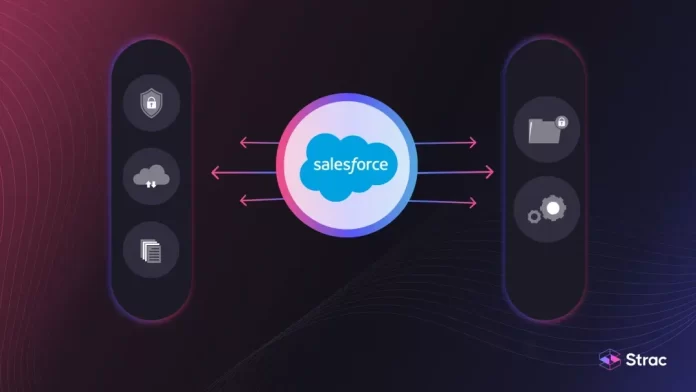In today’s rapidly evolving digital landscape, businesses across the globe are making the crucial transition from on-premises systems to cloud-based solutions, especially when it comes to Customer Relationship Management (CRM) plans. CRMs like Salesforce have become the nerve center for many businesses, managing vast amounts of sensitive and invaluable data. However, with the shift to the cloud, the need for data protection has become paramount. In light of this, the Salesforce CRM Data Loss Prevention concept is gaining significant traction. But how can businesses ensure the sanctity of their CRM data? Here’s a deep dive into the best practices.
- Understand the Value of Your Data:
Every data in your CRM, from customer contact details to sales transactions, has an intrinsic value. Recognizing the potential harm caused by a data breach or loss is the first step toward implementing robust protective measures.
- Employ PII Detection and Redaction:
Personally Identifiable Information (PII) is often at the heart of CRM systems. It’s imperative for businesses to understand where this data resides and to have mechanisms in place to detect it. Companies like Strac, which have made strides in offering services like Detect & Redact PII across India, provide solutions that can be instrumental for businesses aiming to safeguard their sensitive data. You can minimize the risk of accidental leaks or exposure through automated detection and redaction.
- Adopt a Comprehensive PII Handling Strategy:
More than merely detecting and redacting PII is required. A comprehensive PII handling strategy is essential. This includes defining who has access to what data, setting up regular audits, and ensuring that any third-party integrations or plugins do not compromise the integrity of your data. Strac’s expertise in PII Handling offers a robust framework for businesses, ensuring that PII isn’t just detected and managed with the utmost care.
- Leverage Document Vaults:
Storing sensitive documents, especially those containing PII, in traditional file storage systems can be a recipe for disaster. Document Vaults, like those provided by Strac, act as fortified storage spaces, offering an additional protection layer. Beyond just storing, they allow controlled access, ensuring only authorized personnel can view or modify the documents.
- Implement Role-based Access Control (RBAC):
Only some employees need access to all the data. By implementing RBAC, businesses can ensure that employees only have access to the data they need for their specific roles, thereby reducing the risk of mishandling.
- Regular Backups and Data Recovery Plans:
Salesforce CRM Data Loss Prevention isn’t just about preventing unauthorized access; it’s also about ensuring you can recover data if something goes wrong. Regular backups and a well-defined data recovery plan can ensure business continuity even in the face of unexpected data losses.
- Stay Updated:
The digital world is in a state of constant evolution. Threats that were non-existent a year ago might be the top concern today. Therefore, regular training sessions for employees and continuous system upgrades are essential to stay ahead of potential risks.
- Choose Partners Wisely:
If you’re outsourcing any part of your CRM management or data handling, choosing partners with a proven track record is essential. Companies like Strac, with their expansive suite of services, can offer the peace of mind businesses need when managing their precious CRM data.
- Understand the Value of Your Data:
Every data in your CRM, from customer contact details to sales transactions, has an intrinsic value. Recognizing the potential harm caused by a data breach or loss is the first step toward implementing robust protective measures.
- Employ PII Detection and Redaction:
Personally Identifiable Information (PII) is often at the heart of CRM systems. It’s imperative for businesses to understand where this data resides and to have mechanisms in place to detect it. Companies like Strac, which have made strides in offering services like Detect & Redact PII across India, provide solutions that can be instrumental for businesses aiming to safeguard their sensitive data. You can minimize the risk of accidental leaks or exposure through automated detection and redaction.
- Adopt a Comprehensive PII Handling Strategy:
More than merely detecting and redacting PII is required. A comprehensive PII handling strategy is essential. This includes defining who has access to what data, setting up regular audits, and ensuring that any third-party integrations or plugins do not compromise the integrity of your data. Strac’s expertise in PII Handling offers a robust framework for businesses, ensuring that PII isn’t just detected and managed with the utmost care.
- Leverage Document Vaults:
Storing sensitive documents, especially those containing PII, in traditional file storage systems can be a recipe for disaster. Document Vaults, like those provided by Strac, act as fortified storage spaces, offering an additional protection layer. Beyond just storing, they allow controlled access, ensuring only authorized personnel can view or modify the documents.
- Regular Backups and Data Recovery Plans:
Salesforce CRM Data Loss Prevention isn’t just about preventing unauthorized access; it’s also about ensuring you can recover data if something goes wrong. Regular backups and a well-defined data recovery plan can ensure business continuity even in the face of unexpected data losses.
- Stay Updated:
The digital world is in a state of constant evolution. Threats that were non-existent a year ago might be the top concern today. Therefore, regular training sessions for employees and continuous system upgrades are essential to stay ahead of potential risks.
In conclusion, the sanctity of your CRM data is not just a technological concern; it’s a business imperative. With the increasing threats to data integrity, businesses must prioritize Salesforce CRM Data Loss Prevention and other protective measures. Leveraging expertise, adopting best practices, and being vigilant can make the difference between a thriving business and one that’s constantly firefighting data-related crises. Remember, in digital data, prevention is always better than cure.



